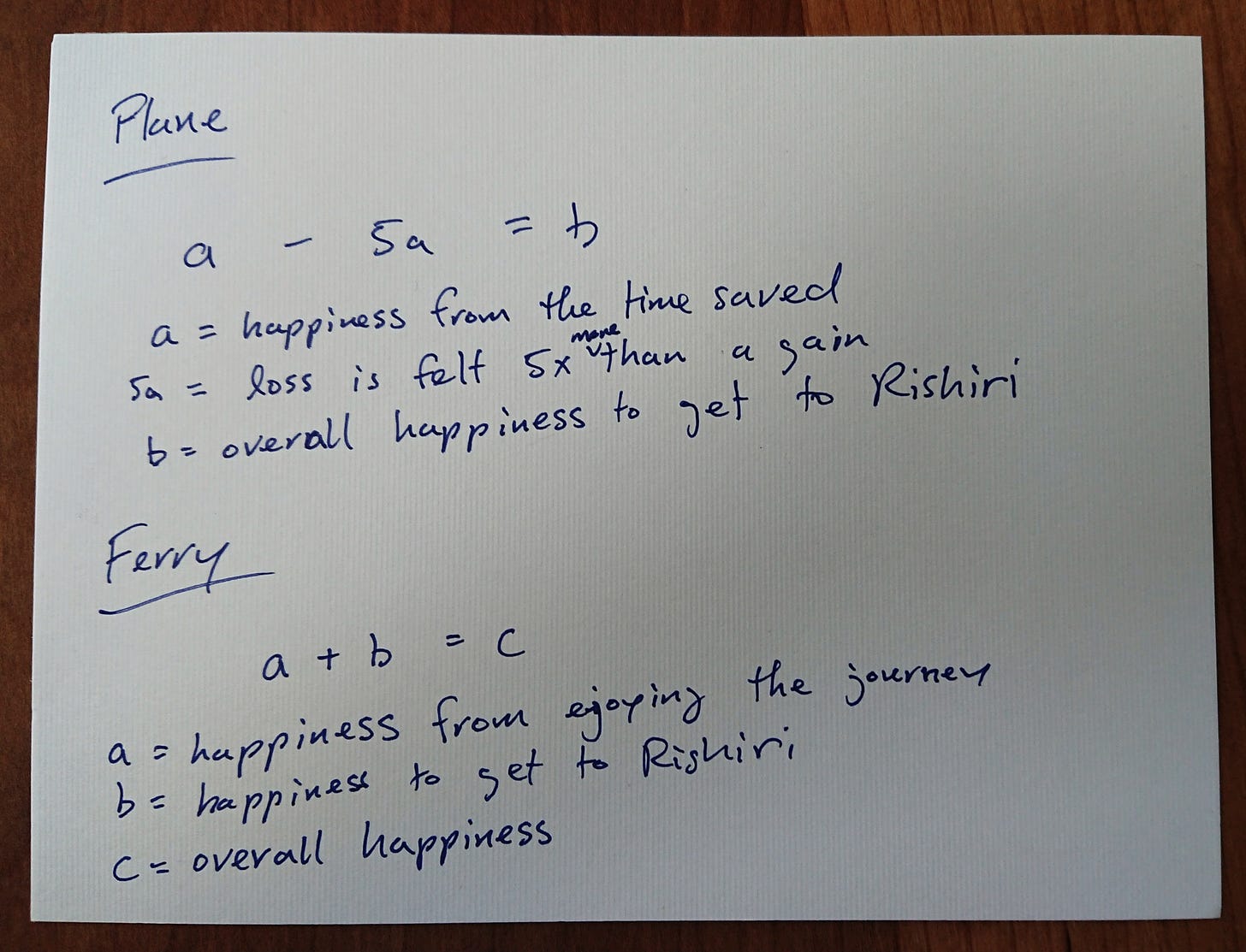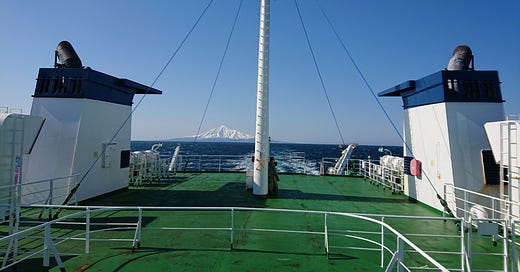Hey, I’m Casey. Welcome to our weekly newsletter sharing the startup journey of Kamui Whisky K.K.. Each week the team or I will share a story as we set up a craft whisky distillery on a remote, volcanic island in the most northern part of Japan.
There are two ways into Rishiri: the ferry and the plane. I’ve always chosen the ferry.
The Ferry
My choice to use the ferry over the plane often gets questioned. The plane is more efficient. It gets you to Rishiri one step quicker, it’s easier to get from the airport to town, and it shaves off time from the whole trip. Which makes me feel pressure, or the need, to explain why I choose the slower ferry.
When I start my explanation I mention the dramatic view, the romance of seeing Mt. Rishiri-Fuji slowly emerge from, or retract into, the ocean.
But I think it is something more.
It is the happiness from giving myself over to the journey.
I’ve lived in frenetic, fast-paced Tokyo for a long time. Tokyo’s pace of life is amongst the fastest in the world. Part of my draw to Rishiri was the more human pace of life, to experience the opposite to Tokyo.
As I encounter frustrating moments setting up this remote whisky distillery, that fantasy of having a slower, closer to nature lifestyle, is probably a key piece of motivational sustenance that keeps me climbing over the endless obstacles.
The Plane
Taking a direct flight from Sapporo to Rishiri is clearly more efficient. You get there faster, meaning you can maximize the time on island. Most of the people I speak with traveling from Tokyo to Rishiri, especially those doing so often, overwhelmingly choose the route by plane.
The thought process seems similar to how Tokyoites generally take holidays - they try to maximize their time away.
But this choice seems to be missing something for me. It means continuing a high pace, rushing, carrying the tempo of Tokyo with you to get to the “relaxation” as fast as possible. But we humans don’t move from a state of high pace to low pace smoothly. We need a transitional phase.
For a long time I couldn’t understand why people rush to relax.
Going from 100km/hr to 0 suddenly, breaking hard, is not pleasant. So why put yourself through this unnecessary pressure to go from a high pace of life to a slower one so quickly? Why not make the deceleration more gradual? More human?
The Psychology of the Equation
Choosing to take the plane to Rishiri shrinks time. The distance doesn’t change, whether it is traveling by ferry or by plane, it is just the time. You get there faster, meaning you move faster, but it doesn’t equate to experiencing more.
Flights to Rishiri often get cancelled. There is chronic low cloud cover. Clouds get stuck on the volcano, covering the island, making it a short, dangerous distance from the bottom of the clouds to the runway. Pilots don’t have time to adjust, and rather than take the risk of a crash, flights are called back, or cancelled before takeoff.

Ferries also get canceled from high waves. But it seems to be more so in winter, when wind blows north westerly. My lazy, limited data pool suggests it is roughly a 20% higher chance of cancellation with the ferry than the more efficient plane.
But even if the ferry gets cancelled at 20% higher rate, the likelihood of frustration remains higher if you chose to travel by plane. The reason: you are trying to maximize efficiency, so the feeling of loss will be much greater now that your plan for a quick arrival, or departure, is lost.
Whereas, if you travel by ferry, you have already made the decision mentally to give yourself over to the journey. You chose the long way home, in terms of time. If there is a cancellation, you don’t feel the loss as deeply. You’ll likely have done a better job maximizing your overall happiness given the fairly high risk of cancellation getting to and from Rishiri on either route.

The Math
I’ve often thought about why I choose the slower way to travel out of Tokyo. I’ve always chosen to fly out of Narita rather than the much closer Haneda. When talking to successful executives about trips, they always seem to chose Haneda, maximizing time, compressing another meeting in to their day. They couldn’t seem to understand why I would chose the 2 hour trip to Narita, via bus no less.
It was the same problem of trying to explain my less efficient choice of travel. But, now, that problem has a solution.
I’ve finally discovered the math.
It took me years to come across, as it was hidden in the 496 page tome, “Scale: The Universal Laws of Growth, Innovation, Sustainability, and the Pace of Life in Organisms, Cities, Economies, and Companies”.
As the population of a town/city doubles the pace of life increases by 1.15x. The pace of life, meaning the number of socio-economic interactions, whether it is meeting someone on the street, buying something from a convenience store, business meetings, whatnot, increases faster than the doubling of the population. That 1.15x means it scales super linearly.
With this formula we can know the difference in the perceived speed of life between massive Tokyo and remote Rishiri.
Rishiri-cho, home of Kamui Whisky K.K., has a population of 2,169.
Tokyo has a day-time population of 15.576 million.
Making Tokyo’s population 7,181x larger.
The super linear scaling rate of socio-economic interactions means Tokyo has a pace of life 8,258 times faster than Rishiri’s (7,181 x 1.15).
That massive difference in the number of socio-economic interactions, on average, makes the perceived speed of life on Rishiri so much slower.
Decelerating from that high speed in Tokyo to Rishiri’s much more pastoral pace is almost the same shock to the psyche as decelerating from 100km to 0km suddenly can be on the body.
The math gives a clearer supporting argument for my desire to take the slower route in and out of Rishiri. We need a transition period. Like surfacing in scuba diving, we need to do it slowly, not shooting through each atmosphere, otherwise we are going to get the bends. Similarly, we need to decompress slowly, as we go into, and out of, a pace of life that is 8,258 times slower than Tokyo’s.
We go to Rishiri to experience something deeper, something slower. We don’t want to bring with us all the anxiety we are trying to escape. Too fast of an acceleration into a high-speed pace of life, or too fast of a deceleration into a slower one, aren’t healthy.
Next time you go to Rishiri choose the ferry.
The transitional phase is a key part of the journey.





Thanks for sharing, Casey. I felt like I was traveling with you in my imagination; peace and joy.
This is one of my favs. It captures the dual nature of Casey-ness, romantic and ruthlessly analytical — a habit of mind that will yield some delicious whisky.